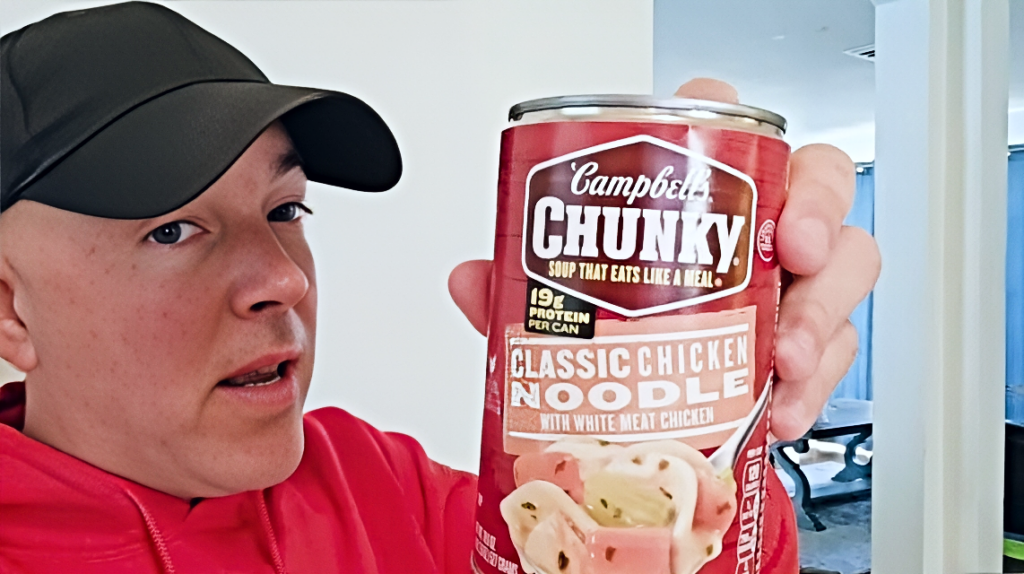The Campbell’s Soup Company is currently facing an investigation by the Attorney General of Florida following explosive allegations that the food giant incorporates 3D chicken meat into its products.
The controversy erupted after a former employee, Robert Garza, filed a lawsuit claiming he was fired for whistleblowing after secretly recording a top executive making inflammatory remarks about the company’s products and customers, including disdain for the alleged use of 3D meat.
The Whistleblower’s Claims and Executive Rant
The investigation stems from a secret recording made by former security analyst Robert Garza of Monroe, who captured an hour-long rant from Campbell’s Vice President and Chief Information Security Officer, Martin Bal. Garza, who usually worked remotely from Campbell’s headquarters in Camden, New Jersey, recorded Bal in person at a restaurant, thinking they would be discussing Garza’s salary.
During the alleged tirade, Bal reportedly attacked company products and employees, stating, “we have shit for poor people who buys our shit.” The recording also exposed Bal allegedly admitting to coming to work high and making racist remarks.
Crucially for the food safety investigation, Garza reports that the incident caused him to look critically at the ingredients, stating he now finds the soup “unhealthy.” Garza reportedly expressed disgust at the prospect of eating the alleged contents, remarking, “I don’t want to eat a piece of chicken that came from a 3D printer.”
Garza says he brought the recording to his direct supervisor in January but was subsequently fired for coming forward, leading to his current lawsuit against Bal, another supervisor, and the Campbell Soup Company. The whistleblower’s allegations of 3D meat suggest the company may be feeding “the worst of the worst, the meat, the mystery meat, the scraps and then just feed it to the peasants, the poor people.”
Florida Investigation Targets Lab-Grown Meat Ban
The state of Florida has launched a full consumer protection division investigation, demanding answers from Campbell. This scrutiny is particularly significant because Florida law bans lab-grown meat. The investigation focuses specifically on the claims regarding the presence of 3D meat, also referred to in the sources as 3D chicken.
Campbell’s Response
Campbell’s headquarters, based in Camden, New Jersey, issued a statement regarding the allegations. The company stated that the alleged comments in the recording are “unacceptable” and “do not reflect our values and the culture of our company,” adding that they are “actively investigating this matter.”
3D-Printed Meat: What You Need to Know
While 3D-printed meat sounds like a cutting-edge breakthrough, the concept has been developing for more than a decade. The earliest research dates back to the early 2010s, when scientists began experimenting with layering edible materials using modified 3D printers. By the mid-2010s, startup labs were producing the first prototypes of plant-based “steaks,” and by 2020, several international companies had advanced the process enough to begin limited commercial testing. The idea took off as food engineers looked for alternatives to traditional livestock production and ways to reduce the environmental strain of meat manufacturing.
As for nutritional value, 3D-printed meats vary widely. Plant-based printed cuts generally mirror the nutrition of other plant-based proteins, offering fiber and lower saturated fat, though often with higher sodium. Cell-based printed meats—made from cultured animal cells—can be formulated to match the nutrient profile of conventional meat, but these versions are still in early testing and not widely available. Every product depends on the ingredients used, meaning there is no single nutritional standard yet.
Food-safety regulators in multiple countries consider certain 3D-printed products safe for consumption, though approval is granted case by case. In the United States, the FDA and USDA have allowed limited sales of cultivated chicken from companies like UPSIDE Foods, while in Israel and Singapore, several 3D-printed cuts have received approval for public tasting.
Major companies adopting 3D-printed meat technology include wholesalers and distributors like Redefine Meat, Steakholder Foods, Aleph Farms, UPSIDE Foods, and MeaTech 3D, all of which continue to expand testing and development as consumer interest grows.
Read our Previous Article on this controversial subject.
Taste the Future: 3D-Printed Steaks?
